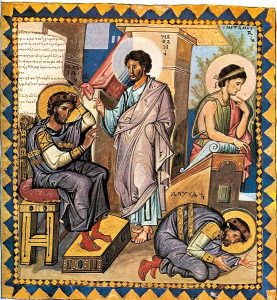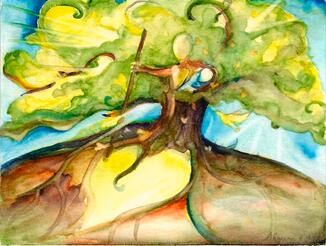
1 Kings 3:3-14, Ephesians 5:15-20
Once at a college faculty meeting, all the staff gathered and there in the midst an angel appears. The angel turns to the dean and says that in return for his unselfish and exemplary behavior, God is going to give him a choice between infinite wealth, wisdom or beauty. Without hesitating, the dean selects wisdom.
“Done!” The angel says and disappears in a cloud of smoke and a bolt of lightning. The room goes silent as all heads turn toward the dean, who sits surrounded by a faint halo of light. After a while, one of his colleagues whispers, “Say something.” (As in, “Say something wise.”)
The dean looks at them and says quietly, “I should have taken the money.”
Wisdom. Is it really just for the few lucky souls who have the good fortune of insight and good judgment that transcends knowledge into this desirable virtue we call wisdom? What about the rest of us?
The Bible has a whole section that we call “wisdom literature”: Psalms, Proverbs, Ecclesiastes, and the Song of Songs. Interspersed throughout the bible are wisdom sayings, like our passage from Ephesians, where Paul says: Be careful then how you live, not as unwise people but as wise. Wisdom is virtue for all.
Paul certainly considers wisdom an essential trait of a mature Christian. So, we would do well to understand what the Bible means when it speaks of wisdom.
Our OT lesson for today lifts up King Solomon, universally characterized as the wisest kings of Israel. Remember King Solomon’s most famous wise judgment: two women who come to him, each claiming the same infant as her own. His answer to the dilemma: cut the child in half! Give each woman half a child. Sounds harsh, the real but it raises up the real mother, who comes forward and says, “No, give the child to the other woman,” while the fraudulent mother says, “go ahead, cut the child in half.” So, in the end, King Solomon makes sure that the real mother gets her baby.
In our passage today we find Solomon at the beginning of his kingship. God asks Solomon what he desires that God give to him. Solomon responds that he wants the ability to govern the people well and to know right from wrong. He knows that people will come to him with problems. Judgments will need to be rendered and decisions will need to be made. He needs to be able to think clearly and well and choose wisely. The answer pleases God, and God grants Solomon a wise and discerning mind, along with riches and honor.
However, King Solomon not only had goodly wisdom, it appears he was wise in the ways of the world. At the beginning of 1Kings 2, we hear King David give Solomon parting instructions to begin his kingship. Twice David refers to Solomon as wise, as David suggests how Solomon should eliminate certain people, now enemies of David. It’s clear David wants Solomon to finish his dirty business and knows Solomon, in his wisdom will find the best way to axe these men. In fact, Solomon does kills four people, his brother, the former general and soldiers and banishes a priest. Then, it is said, his kingdom was secured.
Another way we see Solomon wise in worldly ways is in how he makes a marriage alliance with the Pharaoh and took the Egyptian princess as his wife, breaking the rule about intermarriage in Deuteronomy 7. Kings ignored this edict and intermarried to form alliances all the time. Solomon, however, with 700 wives from all around the world and 300 concubines, would end up influenced by his foreign beauties and this would ultimately lead to a rupture in the kingdom after his death. But that’s the way of worldly wisdom for you.
What the Bible means by wisdom is not high intellect or flowery prose or scholarly conversation. It’s not a subject reserved for academics or geniuses or gurus on mountaintops. In the Bible, wisdom is pretty much synonymous with common sense. Here are some wise quotes from Proverbs, the Bible’s primer on wisdom: “A soft answer turns away wrath, but a harsh word stirs up anger.” (15:1). Even many of Jesus’ teachings were influenced by the wisdom tradition of scripture: “Do not be anxious about tomorrow, for tomorrow will be anxious for itself. Let the day's own trouble be sufficient for the day.”(Matt. 6:25)
Be careful then, how you live, Paul tells us, not as unwise people but as wise, making the most of the time, because the days are evil.
Wisdom is not just for the big decisions. We need wisdom for the seemingly mundane decisions, about eating and drinking, about spending money and spending time. About relationships and work and play. About every part of our day-to-day life. Do we cancel worship in the face of a storm. In describing this wisdom, Paul uses a very interesting word in the phrase “making the most of the time.” Some other translations say, “redeeming the time.” The actual meaning of the Greek word is something like “buying wisely in the marketplace.” The point is to make resourceful and good decisions about how we spend our life, not just our money. And that’s why the translators call it “making the most of the time.”
In an average lifetime, the average American spends16 years working, 13 years watching TV, makes 1,811 trips to McDonalds, eats 35,138 cookies and 1,483 pounds of candy, catches 304 colds, is involved in 6 motor vehicle accidents, and spends 24 years sleeping. Can you guess how much time this same chart listed the average American spends doing religious activities? Only half a year, or 0.7% of their entire life! In other words, the average American spends more time dressing him/herself than they do taking care of their spiritual well-being. We are far from being a wise people. It is what Paul addresses in his instructions to the Ephesian Christians, and to us: summed up with two words: Live Wisely.
Time is one of the greatest gifts God gives to us. You and I and every other person born into this world has a limited amount of time in this life, and no matter how many years you live it goes by very fast. All of us get the same number of hours to use each day, the same number of moments to make the most of. Once they are gone we can never get them back. So, the beginning of wisdom is to recognize the preciousness of time. It is finite. We have only today. How will we choose to live the rest of this day? Wisdom comes in recognizing that in every hour comes disguised and not so disguised opportunities to love well, to be kind, forgiving and caring. Wisdom then, is seeking to live each day like Jesus, serving our neighbors.
You and I have approximately 14/13 hours left today. How will we choose to live? Who will we see, or not see? What will we say, or not say? What opportunity to help will we seize or ignore? May we live wisely, living like Jesus -- who, filled with the spirit, loved those who crossed his path, brought healing, hope and good news. Let us remember that living wisely can change lives, beginning with us – and change those we meet. Be wise. Today and always.
Amen.
(paraphrased from Betsy Devine and Joel E. Cohen, Absolute Zero Gravity)
(per C. Wilton, Preaching Workbook, Series VIII cycle B, 206)






 RSS Feed
RSS Feed